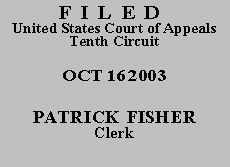

| JOHN PRESSPRICH,
Plaintiff-Appellant, v. AEROFLEX, INC., Defendant-Appellee. |
|
Plaintiff appeals the district court's grant of summary judgment in this contract action. We have jurisdiction under 28 U.S.C. § 1291, and we affirm. We review the district court's summary judgment ruling de novo, applying the same legal standard used by the district court under Fed. R. Civ. P. 56(c). See Simms v. Okla. ex rel. Dep't of Mental Health & Substance Abuse Servs., 165 F.3d 1321, 1326 (10th Cir. 1999).
The facts are not in dispute. Defendant Aeroflex, Inc. acquired all outstanding stock of UTMC Microelectronic Systems, Inc. in 1999, thereafter holding UTMC as a wholly owned subsidiary. At the time of the closing, Aeroflex granted plaintiff and certain other employees of UTMC stock options as an inducement to remain employed by UTMC after Aeroflex's acquisition. The stock agreement allowed the optionees to purchase a total of five thousand shares of stock by exercising the option after one year from the date of the agreement for not more than half the allowed shares and after two years for up to the entire number of granted shares. The agreement further provided that any unexpired option would terminate at the termination of the optionee's employment, except that the optionee retained a sixty-day grace period after termination in which to purchase "all or part of the shares with respect to which such [o]ptionee is entitled to exercise such option." Aplt. App. at 77.
Plaintiff voluntarily terminated his employment with UTMC approximately eleven months after signing the stock option agreement. Within sixty days after termination, he attempted to exercise his stock option, which defendant declined on the ground that plaintiff was not entitled to exercise his stock option under the terms of the agreement. Plaintiff then commenced this action in state district court; defendant removed the matter to federal court based on diversity of citizenship.
Under Colorado law, the primary goal of contract interpretation is to determine and give effect to the parties' intent. Ad Two, Inc. v. City & County of Denver ex rel. Manager of Aviation, 9 P.3d 373, 376 (Colo. 2000). Moreover, barring ambiguity, the intent of the parties is to be determined by the language of the instrument itself. Atlantic Richfield Co. v. Farm Credit Bank of Wichita, 226 F.3d 1138, 1149 (10th Cir. 2000). Here, neither party argues that the terms of the stock option agreement are ambiguous. Rather, plaintiff contends that "there is nothing in the agreement that required [him] to remain with the company for at least a year before being entitled to exercise the option." Aplt. Br. at 6. We disagree.
The stock option in this case specifically intended and contemplated plaintiff's continued employment with the company. The incentive for that continued employment was a stock option partly exercisable after one year and fully vested after two. Plaintiff admitted that on the date he voluntarily terminated his employment, he was not entitled to exercise any portion of his stock option. Aplt. App. at 44. He further admitted he was advised by defendant's representatives that the stock option would terminate the day his employment terminated. Id. at 43-44.
We fully concur with the reasoning of the district court that plaintiff's stock option expired when he terminated his employment with defendant and that the two-month grace period only applied to his exercising the option he had at termination. Since he had no such option then, there was nothing for him to later exercise.
Accordingly, for these and substantially the reasons stated by the district court in its September 30, 2002 Order and Memorandum of Decision, the judgment of the district court is AFFIRMED.
Entered for the Court
William J. Holloway, Jr.
Circuit Judge
*. This order and judgment is not binding precedent, except under the doctrines of law of the case, res judicata, and collateral estoppel. The court generally disfavors the citation of orders and judgments; nevertheless, an order and judgment may be cited under the terms and conditions of 10th Cir. R. 36.3.